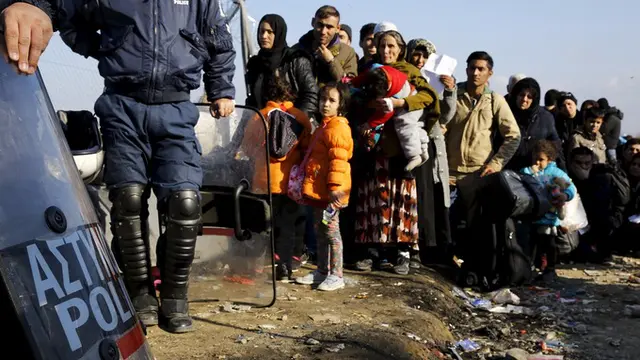The European Union (EU) finished an unusual marathon summit early Tuesday with Turkey, which is eager to obtain EU membership, resulting in a pending deal as the two sides bargained for a promising solution to the ongoing migration crisis.
Turkey needs to respond to the call from the EU as a candidate country, said the EU's foreign policy chief Federica Mogherini ahead of the summit on Monday. Ankara has viewed the summit as a good chance to accelerate its accession process to the bloc.
However, to the surprise of the EU, Turkey didn't intend to be obedient in this respect. Instead, it brought up new proposals at the summit.
Turkish Prime Minister Ahmet Davutoglu not only asked the EU to provide an extra three billion euros (3.3 billion U.S. dollars) to help settle massive migrant flows, but also demanded visa-free travel to EU countries for the Turks.
The EU and Turkey last November came up with an action plan, aiming to stem the massive migrant flows with Brussels promising to distribute three billion euros to Ankara to provide assistance to the refugees.
Ankara was reported to have complained about the EU's slowness in allocating the money. Davutoglu was also reportedly urged by Turkish President Recep Tayyip Erdogan to "bring back the three billion euros."
By now, the European Parliament (EP) announced it would hold a debate on Wednesday on the conclusions of the EU-Turkey summit at a plenary session that lasts until Thursday. Yet the EU has decided to postpone the decision on the migration deal with Turkey until the next summit on March 17-18.
Europe has been going through the worst refugee crisis since World War II. Greece, a front-line country in the crisis, currently sees some 2,000 refugees arriving on its shores each day.
European Council President Donald Tusk admitted that "the flow of migrants passing from Turkey to Greece remains much too high and needs to be brought down significantly," during a press conference following the summit early Tuesday morning.
Meanwhile, the EU is also cooperating closely with NATO in coping with the worsening migration crisis.
NATO Secretary General Jens Stoltenberg announced late February that NATO was to participate in international efforts to cut the lines of illegal trafficking and illegal migration across the Aegean Sea as part of the efforts to deal with the refugee and migrant crisis in Europe.
NATO also intended to establish direct links with EU's border agency Frontex and would conduct its activities in the Aegean Sea.
But all of those tasks require coordination from Turkey.
Turkey is "bearing the brunt of the greatest refugee and migrant crisis since the Second World War in Europe," Stoltenberg told the joint press conference with Davutoglu on Monday.
Stoltenberg said NATO ships are currently collecting information and conducting monitoring to support Turkey, Greece and Frontex in their efforts to tackle human trafficking and criminal networks.
"We are expanding the area of activity into the territorial waters of Turkey and Greece in close coordination with both Allies. So NATO is starting activities in territorial waters today," the NATO chief said.
Tusk said he welcomed what NATO has done in the Aegean Sea, hoping it would "enhance intelligence and surveillance with a view to stemming migrant crossings."
"This operation will not work without Turkey's readiness to take back all irregular migrants who have been apprehended in Turkish waters," Tusk added.
Apparently, Ankara is fully aware of its importance as well as its bargaining power.
On the one hand, it has promised to send back all the irregular migrants crossing from Turkey into the Greek islands, apparently to relieve the exhausted EU.
On the other hand, more money from the EU, visa liberation as well as accession to the EU are what it wants the EU to pay for the country's "kindness."
The demanding candidate country has put the EU into another dilemma, as it firmly hopes to defend the fully functioning of its Schengen system that is threatened by the influx of refugees. But now, it faces a bargaining price for maintaining the system that it is proud of.
All of these are now to be left to the upcoming summit to decide in less than 10 days.
Meanwhile, more and more refugees, ignoring what the EU has done to reject them, are on their way to the region. Enditem
 简体中文
简体中文

